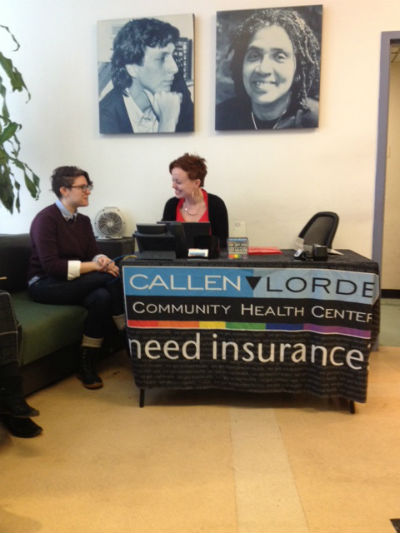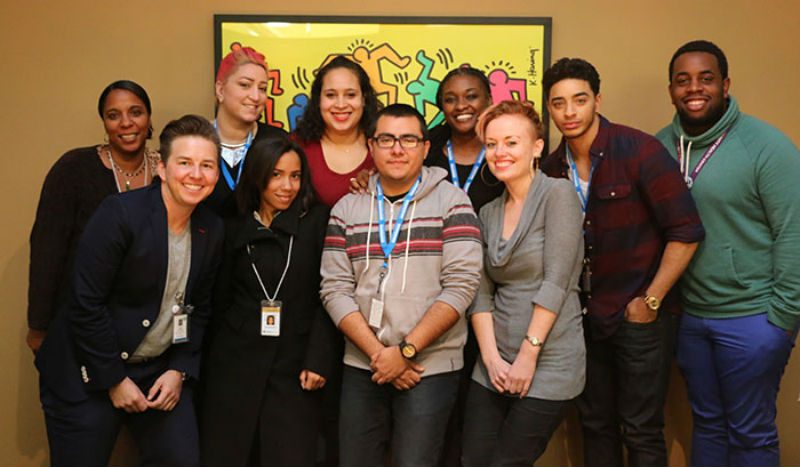The Affordable Care Act, The End of Open Enrollment, and Getting Help to Sign Up.
I don’t quite get it when folks talk about insurance “not being sexy.” I was uninsured for a decade until last year, and to me, access to healthcare is blazing hot. In fact, I’m about 86 percent sure I had a threeway with a ladyfriend and my insurance card last Friday night.
In the US, access to health Insurance is an important part of being able to take care of what ails you and get the preventative care that keeps your body up and running. The Affordable Care Act, while not perfect, has helped LGBT folks access care in some major ways. But you got to be in it to win it, and open enrollment for this year ends on February 15th.
I talked with Star Morris, Manager of Insurance Navigation at Callen Lorde Community Health Center in New York to get the whole story.
Fact #1: Don’t wait until softball season, the time to get covered is now.
Morris–who runs a team of seven highly trained navigators who specialize in walking LGBT people through the enrollment process– explains “open enrollment ends February 15th, and after that you can only sign up for an ACA plan if you have a life event: a change in marital status, family size, citizenship, employment or address. And you’ve got to apply within 60 days of such a qualifying event. Developing a medical condition is not a qualifying event.”
So in other words, if you miss the February 15th deadline, and blow out your knee sliding into home base this summer, you won’t be able to just hop onto an ACA plan to get your torn ASL fixed. What you decide now is your decision for the rest of the calendar year.
Fact #2: Don’t let ID worries (lack of ID and any varieties of ID gender difficulties) stop you from applying
Morris’ team often works with young LGBT people in the homeless shelter system. Morris explains “They sometimes don’t have the documents they need. Their parents might be withholding their documents or they may have been lost or stolen. We can either connect them with a case manager who can help them apply for new copies, or at other times there are forms we can help them fill out to arrange a legal workaround in hardship cases. It is a process but there are ways we can help verified homeless individuals “
Also, navigators like those at Callen Lorde (see fact #6) are able to help applicants work through the strategy needed to pass “identity proofing” in regards to gender markers, which might be easier than you think once you talk to someone who knows which federal systems are used to match the information. If you’ve had a name change or corrected a gender marker, they can also help you get your insurance cards updated with correct info.
Morris added “Even if you’re not a citizen, there are still some some benefits that you can access, so it’s worth talking to a navigator to find out.”
Fact #3 Healthy? Awesome. Health insurance is still important for you.
Morris explains: “A big part of the ACA is about an emphasis on preventative care, so with ACA insurance at your annual check up and all preventative screenings are free. We had a relatively young person, someone who we helped sign-up for insurance, she was just getting insured because she was supposed to, not because she was worried. She went in for a check-up, during her mammogram they found a breast lump, and ending up having the lump removed. She called us back to say thank you and that she was very lucky, that she probably wouldn’t have gotten the check-up if she hadn’t been insured”

Fact #4: This is not your grandmother’s low cost insurance policy
Morris said “There used to be ‘low cost’ insurance programs in NY before the ACA that were still out of reach for many low income people. The new options available through the ACA offer more comprehensive coverage and the financial assistance can bring the cost down to a percentage of their income that is actually affordable. A Navigator can help you choose a plan that is going to give you the best combination of Premium Tax Credits and Cost Sharing Reductions to get the most out of the help available. There are also programs which can help cover the cost of higher premiums for people with HIV/AIDS and other specific health concerns. The application takes less than an hour with a Navigator. It is worth finding out what you qualify for, you may be pleasantly surprised at your options! Especially if you live in a state with Medicaid expansion, many people who wouldn’t have been eligible before can now get their insurance for free.”
Fact #5 Insurance can be confusing. Sexy, but confusing. That’s why there is help available
As Morris explained “There can be a lot of different arrangements of queer families and it’s important to understand that the federal definition of household doesn’t necessarily line up with who you consider family or who you live with. For example, a domestic partner cannot be considered a dependant so if they are not legally married, couples have to apply as two separate adults and two different households.
Also, there is not a single best insurance plan for everyone, Morris said, it depends on your personal health needs and history: “The least expensive plan per month is the most expensive plan when you go to use it. “
Fact #6 You can get help in your area from folks who know and understand queers.
To find a culturally competent navigator near you, go to the “Find local help” on the Out2Enroll website. Plug in your zip code and a cute little rainbow will come up next to organizations that are trained to work with LGBT people and committed to creating an affirming environment.
Fact #7 OMG Call already.
Morris explains “Open enrollment is ending more than a month earlier this year than last; the last day is February 15th. Schedule an appointment now because everyone waits until the last minute and at some point we’ll have no appointments left”
